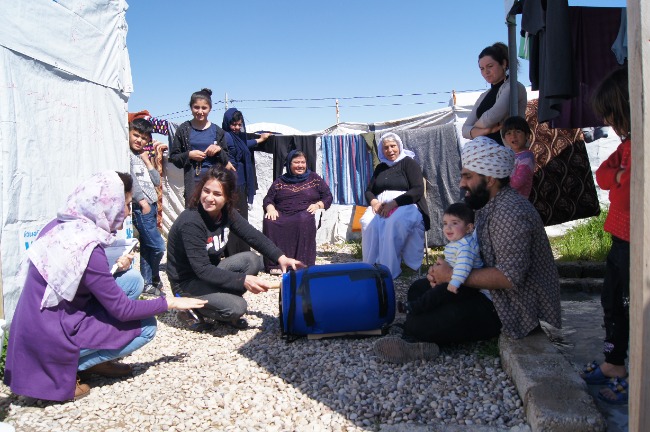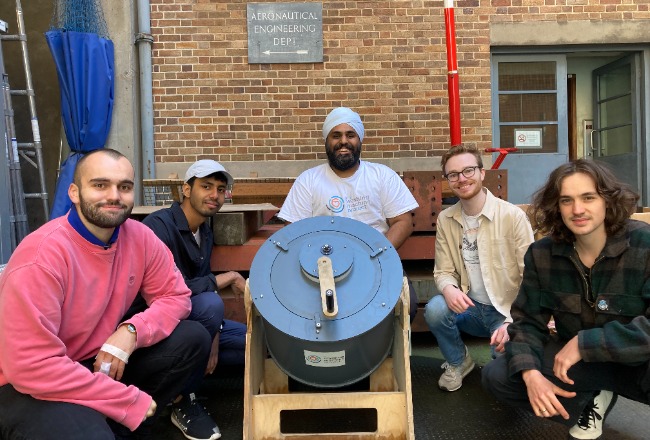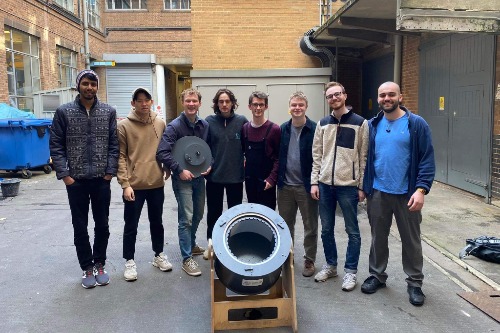The $35 poverty-busting product from nonprofit The Washing Machine Project saves families up to 20 hours of hand washing a week.
It is the brainchild of former Dyson engineer Navjot Sawhney, who dreamt it up during a sabbatical in India.
Now, with 3,000 units on order, he has mobilised a team of eight University of Bristol Engineering Design students to help bring the machine up to the best possible spec.
Each student is working on one part of the washing machine: from improving the manufacturing process to making its materials more sustainable.
Student Henry Morgan is looking at how to refine the hand crank, including whether a small motor could be linked up to solar panels to make washing clothes even easier.
He said: “Engineering for good is what I’ve always wanted to do, so to do something hands on with a humanitarian benefit is amazing.
“Many of the machines will go to refugee camps and really poor areas of the world. It’s hard to think of a more different environment to that than a controlled lab in Bristol, but it’s really nice to see tangible evidence of what we’re doing helping people in difficult circumstances.”
The eight students are in their fourth year. In their fifth and final year they will bring their individual research together for a group design project, looking at how to make the washing machine as robust, efficient and user friendly as possible.

- Navjot Sawhney (right of photo) on a research trip in Iraq. Photo courtesy of The Washing Machine Project.
Student Paul Ertl is researching the machine’s performance. Armed with strips of stained white t-shirt he is finding its optimum cycle length, water volume and detergent ratio.
“Knowing that this research will actually be used to improve people’s lives means it’s the most engaged I’ve been on a project,” Paul said.
“Sometimes it’s actually quite annoying working on something so interesting - people are constantly stopping me to ask what I’m doing and to offer suggestions, plus I’m getting a sore arm from cranking the machine all day!”
Some 6 billion people around the world live without a washing machine. For many the problem is a lack of funds, while others may not have consistent access to electricity, or no access at all.
Mr Sawhney saw the need for hand spun washing machines while making cooking stoves for a social enterprise in Pondicherry, south east India, in 2016.
Staying in a small village close to the city he struck up a friendship with a local woman called Divya.
During their long chats he noticed how much of her time was spent on the exhausting work of hand-washing clothes. He promised Divya he’d come up with a solution.
Six years later and the machine is about to be rolled out across the world.
Mr Sawhney said it had been “hugely inspirational and humbling” to work with students so full of ideas.
“Gen Z is quite angry at the world they’re inheriting and want to make a difference,” he said. “When I graduated eight years ago I jumped at a grad scheme to make vacuum cleaners for rich people - these guys really want to make change.
“The research they are doing will directly change the design of our machine and therefore the product that people use on the ground. They have already given us some really good insights.”

- Navjot with some of the Engineering Design students.
Bristol engineering firm Huxlo, founded and run by former University of Bristol Engineering Design student Matthew Mew, has manufactured a pilot batch of machines pro-bono.
Mr Mew said: “The Washing Machine Project has commendable and ambitious goals, our expertise in digital manufacturing has pushed them a little further towards the destination.”
The Washing Machine Project has already built 200 machines. Over the next year it will up-scale as it looks to fulfil orders for 3,000 machines in refugee camps and poorer regions in Iraq, India, Lebanon and more.
Around 15% of interest has come from low-income families in the UK.
To find out more and donate to the Washing Machine Project, visit their website. For more on Bristol’s Engineering Design course visit their website. For more on Huxlo visit their website.
